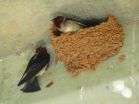(Press-News.org) Water has been detected in the atmosphere of a planet outside our solar system with a new technique that could help researchers to learn how many planets with water, like Earth, exist throughout the universe. The team of scientists that made the discovery includes astronomers at Penn State University and other institutions. The astronomers detected the water in the atmosphere of a planet as massive as Jupiter that is orbiting the nearby star tau Boötis. The discovery is described in a scientific paper published in the 24 February 2014 online version of The Astrophysical Journal Letters.
Chad Bender, a research associate in the Penn State Department of Astronomy and Astrophysics and a co-author of the paper, said "Planets like tau Boötes b, which are as massive as Jupiter but much hotter, do not exist in our solar system. Our detection of water in the atmosphere of tau Boötes b is important because it helps us understand how these exotic hot-Jupiter planets form and evolve. It also demonstrates the effectiveness of our new technique, which detects the infrared radiation in the atmospheres of these planets."
Scientists previously had detected water vapor on a handful of other planets, using a technique that works only if a planet has an orbit that passes it in front of its star, when viewed from Earth. Scientists also were able to use another imaging technique that works only if the planet is sufficiently far away from its host star. However, significant portions of the population of extrasolar planets do not fit either of these criteria, and there had not been a way to discover information about the atmospheres of these planets.
"We now are applying our effective new infrared technique to several other non-transiting planets orbiting stars near the Sun," Bender said. "These planets are much closer to us than the nearest transiting planets, but largely have been ignored by astronomers because directly measuring their atmospheres with previously existing techniques was difficult or impossible." With the new detection technique and more-powerful future telescopes such as the James Webb Space Telescope and the Thirty Meter Telescope, the astronomers expect to be able to examine the atmospheres of planets that are much cooler and more distant from their host stars, where liquid water is even more likely to exist.
Bender is leading a larger project to characterize the atmospheres of many hot-Jupiter extrasolar planets. The tau Boötis discovery is one subcomponent of this larger project. The data analysis and publication of the tau Boötis discovery was led by Alexandra Lockwood at Caltech as part of her thesis with her advisor Geoffrey Blake, Professor of Cosmochemistry and Planetary Sciences and Professor of Chemistry at Caltech, and much of the initial data reduction for this discovery was carried out by Alexander Richert, a Penn State graduate student.
INFORMATION:
The findings appear in the The Astrophysical Journal Letters in a paper titled "Near-IR Direct Detection of Water Vapor in tau Boötis b." The coauthors of the paper are at institutions including CalTech, Penn State University, the Naval Research Laboratory, the University of Arizona, and the Harvard-Smithsonian Center for Astrophysics. The work was funded by the National Science Foundation Graduate Research Fellowship Program, the David and Lucile Packard and Alfred P. Sloan foundations, and the Penn State University Center for Exoplanets and Habitable Worlds.
Barbara K. Kennedy
CONTACTS
Chad Bender: cbender@psu.edu, 814-234-0875 (office)
Barbara Kennedy (PIO): science@psu.edu, 814-863-4682
IMAGES
High-resolution images are online at http://science.psu.edu/news-and-events/2014-news/Bender2-2014
Water is detected in a planet outside our solar system
2014-02-25
ELSE PRESS RELEASES FROM THIS DATE:
New blood test could detect heart attacks more quickly
2014-02-25
MAYWOOD, Ill. – A new blood test can detect heart attacks hours faster than the current gold-standard blood test, according to a study led by Loyola University Chicago Stritch School of Medicine researchers.
The new test measures a protein that is released to the bloodstream by dying heart muscle. The protein is called cardiac myosin binding protein-C (cMyBP-C). The study found that cMyBP-C is released to the blood within just 15 minutes of cardiac damage, and rises to significant levels in three hours.
"This is a potential ultra-early biomarker that could confirm whether ...
Vascular disease affecting women 'poorly understood' by many health care providers
2014-02-25
MAYWOOD, IL – A vascular disease called fibromuscular dysplasia, which can cause high blood pressure, kidney failure, stroke and other symptoms -- mostly in women -- is "poorly understood by many healthcare providers," according to a Scientific Statement from the American Heart Association.
Neurologist Jose Biller, MD, of Loyola University Medical Center, is a co-author of the statement, published online ahead of print in the American Heart Association journal Circulation. First author is Jeffrey W. Olin, DO of Mount Sinai School of Medicine.
Biller said FMD "is a ...
Using stolen computer processing cycles to mine Bitcoin
2014-02-25
A team of computer scientists at the University of California, San Diego, has taken an unprecedented, in-depth look at how malware operators use the computers they infect to mine Bitcoin, a virtual currency whose value is highly volatile.
Researchers examined more than 2,000 pieces of malware used by Bitcoin mining operations in 2012 and 2013. They were able to estimate how much money operators made off their operations and which countries were most affected. The computer scientists report that the revenue of 10 of the mining operations they studied reached at least 4,500 ...
Strawberries lower cholesterol
2014-02-25
A team of volunteers ate half a kilo of strawberries a day for a month to see whether it altered their blood parameters in any way. At the end of this unusual treatment, their levels of bad cholesterol and triglycerides reduced significantly, according to the analyses conducted by Italian and Spanish scientists.
Several studies had already demonstrated the antioxidant capacity of strawberries, but now researchers from the Università Politecnica delle Marche (UNIVPM, Italy), together with colleagues from the Universities of Salamanca, Granada and Seville (Spain), conducted ...
The importance of (experimental) design
2014-02-25
There are clear advantages to living in cities: safety, ready availability of infrastructure, plenty of company etc. Nevertheless, a large number of people eschew them for the benefits of country life, such as clean air and lots of space. Many species of animals, and particularly birds, face the same choice between living in large groups or remaining in smaller ones, thereby avoiding disadvantages of larger colonies such as the increased risk of disease and increased aggression from neighbours. What causes different individuals of a particular species to take the decisions ...
New study finds concussion-related health problems in retired football players
2014-02-25
New Rochelle, NY, February 25, 2014—Repeated concussions and mild brain trauma can result in reduced levels of growth hormone, gonadotropin, and thyroid hormones, causing disorders such as metabolic syndrome and erectile dysfunction and overall poor quality of life. The results of a new study of retired professional football players that compares number of concussions sustained during their careers and health problems associated with hormonal deficiency is published in Journal of Neurotrauma, a peer-reviewed journal from Mary Ann Liebert, Inc., publishers. The article is ...
Mother to child HIV transmission at record low in the UK
2014-02-25
The rate of mother to child HIV transmission is at an all-time low in the UK, according to a paper published today in the journal AIDS.
The study examined over 12 000 pregnancies in women diagnosed with HIV before or during pregnancy and delivered in 2000-2011; there was a four-fold drop in the rate of mother to child transmissions, from 2.1% in 2000-2001 to 0.46% in 2010-2011.
Dr Claire Townsend (UCL Institute of Child Health) said: "Mother to child HIV transmission is now at the lowest level ever in the UK & Ireland, and as far as we're aware such low levels have ...
System that automatically fills gaps in programmers' code gains power
2014-02-25
Since he was a graduate student, Armando Solar-Lezama, an associate professor in MIT's Department of Electrical Engineering and Computer Science, has been working on a programming language called Sketch, which allows programmers to simply omit some of the computational details of their code. Sketch then automatically fills in the gaps.
If it's fleshed out and made more user-friendly, Sketch could ultimately make life easier for software developers. But in the meantime, it's proving its worth as the basis for other tools that exploit the mechanics of "program synthesis," ...
NASA's SDO shows images of significant solar flare
2014-02-25
The sun emitted a significant solar flare, peaking at 7:49 p.m. EST on Feb. 24, 2014. NASA's Solar Dynamics Observatory, which keeps a constant watch on the sun, captured images of the event.
Solar flares are powerful bursts of radiation, appearing as giant flashes of light in the SDO images. Harmful radiation from a flare cannot pass through Earth's atmosphere to physically affect humans on the ground, however -- when intense enough -- they can disturb the atmosphere in the layer where GPS and communications signals travel.
To see how this event may impact Earth, please ...
Scientists explore promising new option for first line of attack in lymphoma
2014-02-25
A study led by Manchester scientists has shown promising results for a new treatment approach in follicular lymphoma.
Follicular lymphoma is a type of non-Hodgkin's lymphoma– a blood cancer - that usually develops slowly. The majority of patients are diagnosed when their disease is at an advanced stage.
Recent improvements in treatment have included the use of antibodies to specifically target the tumour cells and to stimulate the patient's own immune system to attack their tumour. The use of such antibodies has improved treatment response, but unfortunately most patients ...






